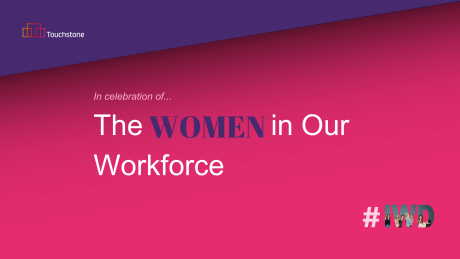In Celebration of The Women in our Workforce: Jon Clark
In Celebration of The Women in our Workforce: Jon Clark

In the lead up to international women’s day, and in celebration of the women in our workplace, we have spoken to colleagues from across the business to understand why inspiring inclusion and investing in women’s careers can have a lasting and positive impact.
During our interviews, we have established that by empowering female careers, our colleagues have been encouraged to stay with Touchstone and progress in ways they didn’t think possible. They have also confessed to finding an unparalleled sense of community at Touchstone, which contributes to a natural magnetism to the company.
At Touchstone, we have undoubtedly seen the benefits and reaped the rewards that inclusion and investing in our female colleagues can have when implemented in our workplace.
We began our interview with Jon Clark, Sales Director at Touchstone, discussing his views on three key statements relating to the property sector:
- In 1975, women could finally open a bank account in their own name and apply for a mortgage without facing discrimination.
- 47% of buy-to-let landlords in the UK are in fact women.
- 27% of senior leadership in the property sector are female (Real Estate Balance Research).
It does amaze me that it wasn’t until 1975 that there was recognition that things needed to change. It is still shocking that until that time, some of these things couldn’t happen.
It also doesn’t surprise me and is rare to see a stat that suggests genuine equality or an equal balance in something.
I’m also not surprised that the percentage of women in senior leadership in this sector is lower than 50%. It would be interesting to know what that figure was 10 years ago because my sense through my career is that there are now more women in senior positions.
Through my 28 years at Touchstone, where I have predominantly been client facing or held a senior position; in senior colleagues, and in senior group or external contacts, I have witnessed an increase in women in those positions.
Generally in very senior positions there are more women. However, if I compare new contracts that we are winning now: Patrizia, PGIM and Citra, it is predominantly women that I liaise with. 20 years ago, it would have been mostly men. So, there has been a shift and I suspect that there are more women coming into the industry and making progress in it.
Tell me about yourself and your career.
I am currently the Sales Director at Touchstone with some additional responsibilities for business compliance. I was introduced to Touchstone via James Perrett, one of the other executive directors in 1996, and started working as an administrator in what was then the refurbishment team.
I moved to a client facing role in 1998, as the portfolios that we were managing at the time were going through a period of change and there was more focus on a strategy for those portfolios, rather than just dealing with individual properties. I had an opportunity to work in that area and I got on quite well.
There were then several senior people who left, and I was given more responsibility and took my chance. I have now been at Touchstone for 28 years, and at various times I have been responsible for all our operations in the non-lender services side of the world, so have had a large proportion of the business report to me. I say this because things change, and you can move around with different focus in different areas and different types of clients. My job has never stayed the same.
Why do you enjoy working for Touchstone?
I really like the people I work with, and I think there is a huge level of trust and a feeling of being in it together. The combination of a business that is developing and very successful in a number of areas, and being seen as a long standing, well-performing, sustainable, compliant, reliable business which continues to change, is really good.
The business has always been a friendly place to work, and in recent times it’s become more evident that it is a very supportive business to work for. It’s flexible, and it thinks flexibly.
My personal experience may not be the same as a junior person, but I know we spend a lot of time thinking about how we can improve things, or how we can keep people. We know that when we are winning new work or securing more work with existing clients, it’s fundamentally down to our people. So how do we keep our people? How do we develop people? How do we keep making the business a place that people want to stay and have their career?
In what ways do you feel that Touchstone is able to support the women in our workforce?
I think fundamentally for years we have had no difference between men and women. Even though some positions might have appeared to be more weighted towards men, there has never been a pro- male attitude and I think we are probably different to other areas of the industry who were still quite laddish a few years back.
Our business is also a large local employer, and people don’t necessarily come to Touchstone at first as a career move. So, because of that, we have always had a good balance when recruiting.
We also provide excellent maternity support and in recent years we have tried to enhance that as much as we can. However, we have also tried to improve paternity rights for people as well and its important to understand how we can make things equitable across the board.
We want to encourage people to stay so our long service reward package is designed to recognise the importance of this.
In a typically male dominated industry, how far has Touchstone come as an inclusive employer and why would you recommend Touchstone as an inclusive employer?
I think we have always been an inclusive employer. We may have a few male executives at the top at the moment, but that is accidental rather than anything else. We have always had a number of women on the exec, although recently they have left due to retirement, career change and various things. When you go beneath that level, it is very balanced.
I would recommend Touchstone because I think we are genuinely a diverse employer. I still see some businesses where this is not the case. We strive to be a very open, inclusive, and approachable business with no barriers between the board and junior members. One thing we always discuss at our strategy days is communication, and how we can be more available or obvious.
We support people across a number of diversities, so whether that is maternity or colleagues handling aging parents, I know we offer flexibility, and this would never come in the way of a colleague’s career.
In my day-to-day, my job is to lead the sales team and to be an executive. As an executive we put in a lot of time to discuss if there is more that we can do, and we invite our HR partner to all exec meetings to talk about those things on a personal level.
I try to get to know people and understand their personal circumstances, to work on a basis of trust within my team. My approach is to ask: are they okay? How much work have they got on? Are they enjoying it? Do they feel pressures? And to interact with people on a microlevel.
What does international women’s day mean to you?
I am surrounded by women at home, so I see the importance of women and diversity because I recognise this in all aspects of my life whether that is at home or work. That may not be the same in most parts of the world so whilst I’m not celebrating the day, I think it’s an important thing.
It’s not necessarily just about women but also diversity, inclusion, and equality in all areas.
Tell me about a woman who inspires you.
Leah Williamson, the captain of the England ladies football team when they won the Euros.
It struck me that in an area which is traditionally male dominated, she was captain at a time when ladies football really gathered momentum particularly in the UK. She was also the first English person to lift a trophy since 1966. Through it all she showed real leadership and a very humble, sensible, and calm attitude. She was very good with the media and a great leader all round.



